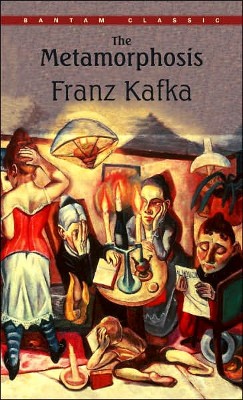
Subscribe to:
Post Comments (Atom)

You're Love in the Time of Cholera!
by Gabriel Garcia Marquez
Like Odysseus in a work of Homer, you demonstrate undying loyalty by
sleeping with as many people as you possibly can. But in your heart you never give
consent! This creates a strange quandary of what love really means to you. On the
one hand, you've loved the same person your whole life, but on the other, your actions
barely speak to this fact. Whatever you do, stick to bottled water. The other stuff
could get you killed.
Take the Book Quiz
at the Blue Pyramid.

You're Infinite Jest!
by David Foster Wallace
While you1 consider yourself2 to be clever,
there are those3 who think you're just full of yourself or, perhaps worse,
playing a joke4 on everyone around you, and yet you are pretty sure that
you really are that brilliant after all, since people would hardly take the time to
get to know you5 if they didn't care very deeply about what you had to
say to them, to wit, about their lives, their hopes, their dreams, their fears, their
drug habits, and of course what videos6 they prefer to watch, since,
after all, your impressive vocabulary and tendency to go on and on7 makes
you seem superior, able to educate them, and really drive a sense of something
ineffable into their measly little skulls while you are not above making a cheap
gag or really going after anyone or anything or telling them about incredible
futures involving tennis, geopolitics, and
1Meaning you personally, not someone like you or your own
personal daddy, for example.
2As well as you can see yourself, which, frankly, may not be that well.
3Though we wouldn't deign to be so peripatetic as to name them here, mind.
4Jokes, though not common in Victorian England, were known to originate
sometime in ancient history, perhaps as early as the time of Babylon, or even before.
It is thought that the history of the joke plays an integral role in the mindset of
the characters depicted here, though you may disagree at this point, in which case I
am facing quite the dilemma in relaying this narrative, no?
5It is rather time consuming, after all.
6Ha!
7and on and on and on...
Take the Book Quiz II
at the Blue Pyramid.

You're The Metamorphosis!
by Franz Kafka
Though you think you're in the midst of a dream, the fact of the
matter is that your life has become a nightmare. The nightmare at first seems
horrific to you, but you are slowly able to adjust to the facts of the matter
and settle down and make do with what you've been given. There are those that
would say you're pointless and absurd, but you're really just trying to
demonstrate that people can (and do) adapt to anything, no matter how absurd
it is. Not that this will really inspire them to change, because they probably
don't understand.
Take the Book Quiz II
at the Blue Pyramid.

13 comments:
More from the sonnerie: I think this song is ghastly, great with the intervening passage of Wendy Carlos's score from A Clockwork Orange...
http://www.imeem.com/rockmusic15/music/_a7f9v7y/the_fiery_furnaces_blackhearted_boy/
Darling black-hearted boy
All the color's gone out of my ribbon loom
As i've only got the worst to assume
Take your sheetmetal sheers
Cut a slit up the side of my dark blue dress
For a last time lie your love confess
Get your gut
Some home made twine
String up silk your tiger bow
Don't paint your board
Moonlight white
Go dangle your fish hook out in the gutter again
See the smoke from your kiln
Pine boughs burn the bricks dead hard in their fog
As I stand cold with my back broke by the bog
Find your cross-cut saw
Come blunt and jagged and dry and try
Cut my tongue out to keep on your wall up high
I tipped my toe
On the bamboo strip
I took stone honey in exchange for my rags
Don't dare paint your board
Moonlight white
Go dangle your fish hook out in the gutter again
See the smoke from your kiln
Pine boughs burn the bricks dead hard in their fog
As i stand cold with my back broke by the bog
Find your cross cut saw
Come blunt and jagged and dry and try
Cut my tongue out to keep on your wall up high
I tipped my toe
On the bamboo strip
I took stone honey in exchange for my rags
Don't dare paint your board
Moonlight white
Go dangle your fish hook out in the gutter again
Darling black-hearted boy
I went down to wash my robe in the river
I thought of you and started to shake and to shiver
Leaning there on the rocks
I see myself slip down and float
'Til the brackish warm current stops up my throat
You swore you swore you'd never leave
You swore you swore you'd never leave
You swore you swore you'd never leave
It showcases words rarely said...
I admire Madame de Sade's work, too. I think of my favorite passages of Camille Paglia's 24th Chapter of Sexual Personae,
"Amherst's Madame de Sade"
"Fable is marshmallow myth; it is myth stripped of chthonian realities. Scratch a fabulist, and you'll find fear of woman and fear of nature. Storytelling or yarn-spinning is what me do among men. It is a ritual of avoidance, a deflection of the psychological turbulence of men's lives with women.
...
Emily Dickinson is the female Sade, and her poems are the prison dreams of a self-incarcerated, sadomasochistic imaginist. When she is rescued from American Studies departments and juxtaposed with Dante and Baudelaire, her barbarities and diabolical acts become glaringly apparent.
...The brutality of this belle of Amherst would stop a truck. She is a virtuoso of sadomasochistic surrealism: "The Brain, within its Groove / Runs evenly and true-- / But let a Splinter swerve."
...
The analogies in art to Dickinson's wood-speared brain are pagan or Catholic: the Iliad's gruesome battlefield deaths or Mantegna's St. Sebastian, transfixed by an arrow from chin to pate. In its sheer gratuitousness, the metaphor resembles the tortures of 120 Days of Sodom, where Sade jams lethal blades, rods, and spikes into every orifice of the body.
...
That Dickinson does imagine the heart as an extracted organ quivering on a flat surface is proved by this stanza, which she attached to a gift of fruit:
My Heart upon a little Plate
Her Palate to delight
A Berry or a Bun, would be,
Might it be an Apricot!
Wearing her heart on her sleeve would be too conventional for our poet, who slaps it on a fruit dish and sends it down the street like a phone-order pizza.
...
It is easy to misread the many lyrics affecting complacent Christian faith. Singsong rhythms and neat rhymes are always spurious in Dickinson, the first modernist master of syncopation and atonality. ...The mood may be cheerful and unbeat, as in "Tie the Strings to my Life, My Lord, / Then, I am ready to go!" (279). But the bride happily surrendering herself to celestial marriage is usually in for an unpleasant surprise.
...
Dickinson's chirpy newlyweds exit from their poems under suspicious circumstances: "I'm 'Wife'! Stop there!" (199). To keep abreast of Dickinson, like Alice running with the Red Queen, the reader must know where the bodies are buried. The speaker is under arrest; heaven is stasis, a permafrost of nonbeing. The bride poems are clever hoaxes that turn princesses into pumpkins, mere chunks of debris. Corpses drop into the grave with a thud. A frequent finale us a slow fade, the voice fumbling for words, as consciousness gutters out.
These poems require patient detective work, for they are intricate with sophisticated puns. Dickinson was a devoted student of her Webster's dictionary. Her wordplay is Alexandrian bookwork, Decadent erudition."
Swirming now. Swerving of atoms is Lucretius.
http://books.google.com/books?id=d4pz99Zq5T8C&lpg=PT11&dq=Calasso%20Literature%20and%20the%20Gods%20The%C3%B3s&pg=PT12#v=onepage&q=Calasso%20Literature%20and%20the%20Gods%20The%C3%B3s&f=false
Excerpted from Tzvi Freeman's "What's So Terrible About Idolatry?"
"This is where Abraham dissented. He saw through the established order with its hierarchy of knowledge and power, and reasoned it to be the source of all evil. And he saw to the root of it: As long as G‑d was 'up there' and everything else was seen as lying on a descending plane further and further removed from His domain, this evil would continue.
Within such a paradigm, human life loses its essential value. You as an individual no longer count. All that matters is how high you are up on the scale. Not only human rights, but also the advance of technology is hindered — by the need of the ruling class to keep the masses working. All progress is to further empower the powerful. Public health, welfare and education are absurdities. So Abraham challenged that hierarchy. He taught each person to call upon the name of the One G‑d of the heavens and the earth, who judges the deeds of all men equally, from the highest king to the most lowly serf. By putting the original G‑d back into the world, Abraham recreated the 'person' — a human who is of value just by being there.
Within the old paradigm, ethics have no base to stand on. If you don't like what one god demands of you, you go find another god more to your taste. Or you work around these gods, tricking or bribing them, as they themselves are wont to do with one another. After all, none of them is supreme, none is all-powerful. Therefore, anything could be justified. So Abraham smashed the idols. Once there is only one G‑d, who supervises all things, morality is no longer relative. All ethics are determined not by the flux of social convenience, but by His intransient standard."
https://www.chabad.org/library/article_cdo/aid/3201/jewish/Whats-So-Terrible-About-Idolatry.htm
Exercise 91.
One of the realities of realizing one might spend one's life alone is that the wheels fall off other illusions. The bedrock disagrees with the backfill of accumulated perceptions.
"Every man is presumed acceptable as a credible witness. Natural truthfulness is, to my way of thinking, an integral part of man’s character. The moment a person sins he lessens his own worth, brings himself down, and becomes spiritually defective, thus forgoing his former status. Sin deprives man of his natural privileges and unique human attributes. He is subjected to a complete transformation as his original personality departs and another one replaces it. This is not a form of punishment, or a fine, and is not imposed in a spirit of anger, wrath, or vindictiveness. It is a 'metaphysical' corruption of the human personality, of the divine image of man.
The Communists speak of the commission of 'error' and of 'deviation,' but have no concept of sin. Error carries no implication of metaphysical impurity or of psychic pollution. An 'error' is a legal, rational term which must be distinguished from 'sin,' which harms the inner quality of man and has a deep and far‑reaching effect on his being.
Indeed, true teshuvah not only achieves kapparah, it should also bring about taharah from tum’ah (spiritual pollution), liberating man from his hard‑hearted ignorance and insensitivity. Such teshuvah restores man’s spiritual viability and rehabilitates him to his original state."
https://www.myjewishlearning.com/article/the-double-purpose-of-yom-kippur/
https://www.youtube.com/watch?v=XgYJ-LOCxbc
I was reading about cow boletes in the bathtub today.
https://directree.org/bovine-bolete-suillus-bovinus/
https://www.wildfooduk.com/mushroom-guide/jersey-cow-fungus/
https://youtu.be/kkZT7fvterA?si=8rUpnxSAW6FNevi_
Exercise 91.
Michlei 31:Eshet Chayil.
https://tzofia.org/2024/09/navigating-the-paradoxes-of-teshuva/
https://www.youtube.com/watch?v=P2LV0HY7ock
https://www.nationsreportcard.gov/
Thank you, for reminding me of teshuva. I have become hard to reach.
Post a Comment